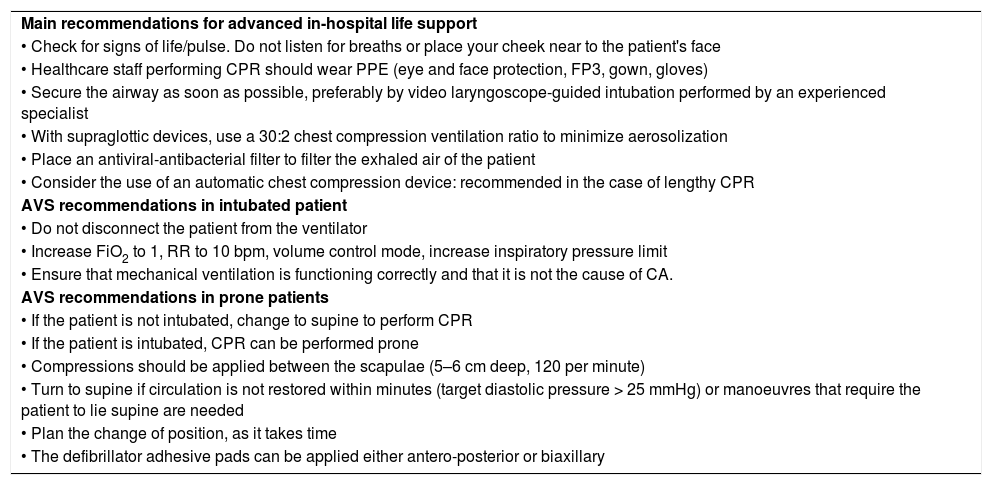The disease COVID-19 produces serious complications that can lead to cardiorespiratory arrest. Quality cardiopulmonary resuscitation (CPR) can improve patient prognosis. The objective of this study is to evaluate the performance of the specialty of Anesthesiology in the management of CPR during the pandemic.
MethodsA survey was carried out with Google Forms consisting of 19 questions. The access link to the questionnaire was sent by email by the Spanish Society of Anesthesia (SEDAR) to all its members.
Results225 responses were obtained. The regions with the highest participation were: Madrid, Catalonia, Valencia and Andalusia. 68.6%% of the participants work in public hospitals. 32% of the participants habitually work in intensive care units (ICU), however, 62.1% have attended critical COVID-19 in the ICU and 72.6% have anesthetized them in the operating room. 26,3% have attended some cardiac arrest, 16,8% of the participants admitted to lead the manoeuvres, 16,8% detailed that it had been another department, and 66,2% was part of the team, but did not lead the assistance. Most of the CPR was performed in supine, only 5% was done in prone position. 54.6% of participants had not taken any course of Advance Life Support (ALS) in the last 2 years. 97.7% of respondents think that Anesthesia should lead the in-hospital CPR.
ConclusionThe specialty of Anesthesiology has actively participated in the care of the critically ill patient and in the management of CPR during the COVID-19 pandemic. However, training and/or updating in ALS is required.
La COVID-19 produce graves complicaciones que pueden derivar en parada cardiorrespiratoria (PCR). Una resucitación cardiopulmonar (RCP) de calidad puede mejorar el pronóstico de los pacientes. El objetivo de este estudio es evaluar el desempeño de la especialidad de Anestesiología en el manejo de la RCP durante la pandemia en España.
MétodosSe realizó una encuesta con Google Forms que constaba de 19 preguntas. El link de acceso al cuestionario fue enviado vía email por la Sociedad Española de Anestesiología y Reanimación (SEDAR) a todos sus miembros.
ResultadosSe obtuvieron 225 respuestas. Las provincias con mayor participación fueron: Madrid, Cataluña, Valencia y Andalucía. El 68,6%% de los participantes trabajan en la sanidad pública. Un 32% de los participantes se dedican habitualmente a los cuidados intensivos, sin embargo, el 62,1% ha atendido a enfermos COVID-19 en cuidados críticos y un 72,6% los ha anestesiado en quirófano. El 26,3% ha atendido alguna PCR, el 16,8% lideró las maniobras, el 16,8% no participó, y el 66,2% formó parte del equipo, pero no lideró la asistencia. La mayoría de las RCP se realizaron en supino, sólo el 5% fue ejecutada en prono. El 54,6% de los participantes no habían realizado ningún curso de Soporte Vital Avanzado (SVA) en los últimos dos años. El 97,7% de los participantes opinan que anestesia debe liderar la RCP intrahospitalaria.
ConclusiónLa especialidad de Anestesiología ha participado activamente en la atención del paciente crítico y en manejo de la RCP durante la pandemia por COVID-19. Sin embargo, resulta necesaria la formación y/o actualización en SVA.








